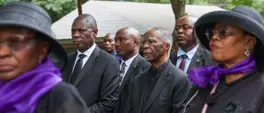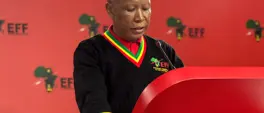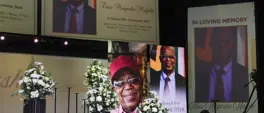MONDE NDLOVU: Blah blah black sheep
Monde Ndlovu
16 September 2022 | 10:00The work of discharging transformation needs both courage and compassion, writes Monde Ndlovu.
The Maduke Lot Ndlovu Legacy trust in partnership with the Black Management Forum, annually celebrate the outstanding contribution Lot Ndlovu has made towards economic transformation. This particular celebration happens annually during the month of August, a month when Lot Ndlovu was born, passed away and buried.
The Lot Ndlovu lecture has become a key annual event in the business calendar, and its continued presence has anchored it as a symbol of reflection, hope, and intellectual progress not only for people in general but for black people in particular.
The lecture was the ninth installment, and the keynote addresses over the years have been graced by the country's top thinkers and change agents. The eighth lecture was addressed online by former President Kgalema Motlanthe, due to the COVID-19 pandemic. The ninth installment was delivered by the former Minister, AZAPO leader, academic and author, Dr Mosibudi Mangena, at the PwC Head Office in Waterfall.
Dr Mangena painted a grim picture of how the apartheid education system has impacted the current understanding of education. He emphatically stated that Lot Ndlovu and himself were both born in the same month of August, in the old Transvaal, raised on a farm, slept in mud houses, and taught by one teacher at school. Travelling by foot was a common mode of navigating apartheid farms and trying to find hope in mud schools within close proximity.
Dr Mangena highlighted a painful yet profound flaw in foundational education, which was to narrate choruses and poems in English that had no meaning to an African child, and its significance was greatly questioned. It was the famous “blah blah black sheep”, that would be recited by African children, who had no inkling of what was meant by these English poems and recitals. They, in turn, have either created a generation that struggles to connect itself to its context through education, or a generation that would fight to change a meaningless framework towards anchoring education within our context as Africans.
The “blah blah black sheep” approach could be the reason why Africans in particular experience a very high dropout rate at all levels of education, including the lowering of the pass mark. The “blah blah black sheep” approach was meaningful to a system that had its trappings and underpinnings of depriving black people of their heritage, language, culture, and wealth.
This approach has made education a distant ideal for many black people and created an emotional barrier to self-development. According to the department of higher education, less than 10% of the population have degrees, TVET certificates, and diplomas. The department is also very concerned about the high dropout rate and the time it takes for students to complete a degree. We indeed have an education crisis, and this will certainly impact future skills and specialisations in the country. Our government seems to be “blah blah black sheeping” the current crisis in education.
The key economic drivers of the country need to be clearly identified so that the education system can adequately prepare itself to provide those key skills needed to propel the economy forward. A national skills audit is also necessary, to feed into the planning process that will enable the country to think more clearly about the future economy, and which industries will drive our economic prospects.
As we celebrate Steve Biko in the month of September, we are reminded that black consciousness as a philosophy exists to reclaim the bruised black mindset and begin to chart a new path towards self-love, self-respect, and self-development. In my view, black consciousness affords us the opportunity to find the intersection between self-actualisation and self-sacrifice.
The Lot Ndlovu lecture affords us this opportunity to challenge the black middle class to model its thinking around the values and story of Lot Ndlovu. Dr Mangena challenged the black middle class, whom he reveres as the petite bourgeoisie, to emulate Lot Ndlovu’s approach to leadership, in that his approach would always advance the economic, educational, and social upliftment of the black majority.
Dr Mangena argued that to get the country out of this rut, we need black people who are mentally liberated, who stand firm in who they are, who believe in the worth and dignity of black people and who stand in solidarity with them.
It is, therefore, no coincidence, that Lot Ndlovu, a black conscious leader, Dr Mangena, a black conscious leader, Steve Biko whom we celebrate in September and Lot Ndlovu in August, find harmony during this time for us to reflect on the importance of black leadership. This being anchored and expressed by Dr Mangena in the present has elevated the need for black consciousness to be deepened in our leadership spaces.
The work of discharging transformation needs both courage and compassion. It needs a re-engineering of our education system, recalibration of our values, and re-igniting of our minds.
These lectures give us hope, in that they do not allow us to forget not only the milestones of our previous leaders, but they give us an opportunity to return to ourselves.
Monde Ndlovu is a consultant for African Leadership Development.














